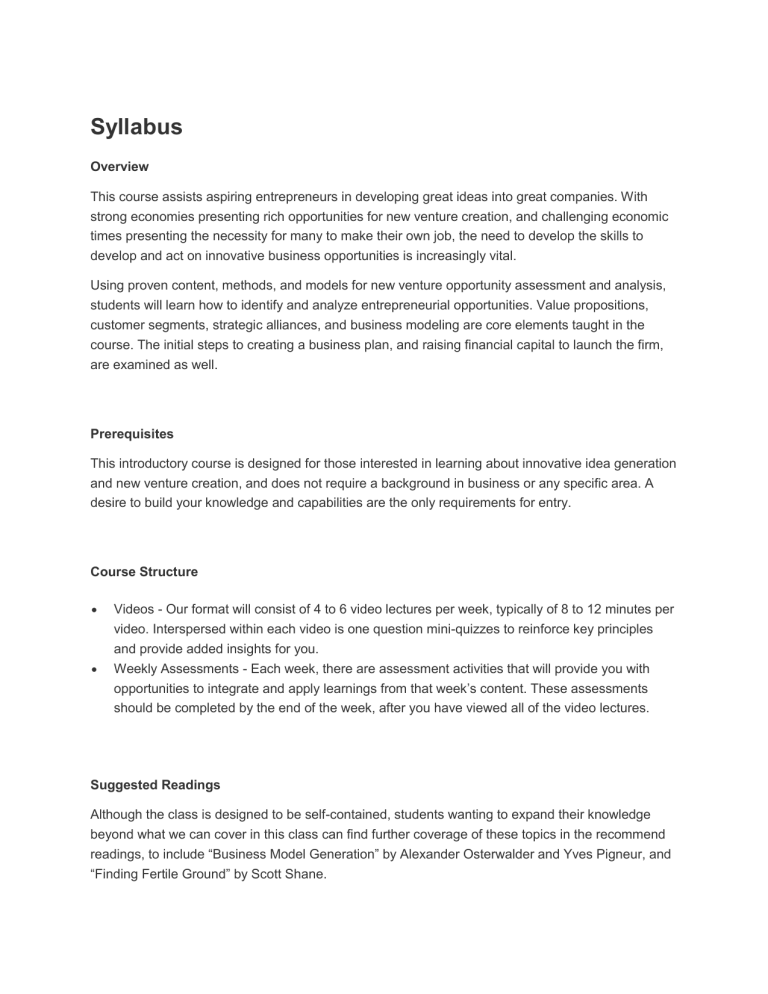
Syllabus Overview This course assists aspiring entrepreneurs in developing great ideas into great companies. With strong economies presenting rich opportunities for new venture creation, and challenging economic times presenting the necessity for many to make their own job, the need to develop the skills to develop and act on innovative business opportunities is increasingly vital. Using proven content, methods, and models for new venture opportunity assessment and analysis, students will learn how to identify and analyze entrepreneurial opportunities. Value propositions, customer segments, strategic alliances, and business modeling are core elements taught in the course. The initial steps to creating a business plan, and raising financial capital to launch the firm, are examined as well. Prerequisites This introductory course is designed for those interested in learning about innovative idea generation and new venture creation, and does not require a background in business or any specific area. A desire to build your knowledge and capabilities are the only requirements for entry. Course Structure Videos - Our format will consist of 4 to 6 video lectures per week, typically of 8 to 12 minutes per video. Interspersed within each video is one question mini-quizzes to reinforce key principles and provide added insights for you. Weekly Assessments - Each week, there are assessment activities that will provide you with opportunities to integrate and apply learnings from that week’s content. These assessments should be completed by the end of the week, after you have viewed all of the video lectures. Suggested Readings Although the class is designed to be self-contained, students wanting to expand their knowledge beyond what we can cover in this class can find further coverage of these topics in the recommend readings, to include “Business Model Generation” by Alexander Osterwalder and Yves Pigneur, and “Finding Fertile Ground” by Scott Shane. Grading The first assignment is a Self-Assessment for 4% of the course grade. Each of the 6 subsequent weekly assignments will constitute 16% of the course grade. Students with a total grade of over 70% will receive an online Statement of Accomplishment. Students with a grade of at least 90% will receive the added designation "with Distinction". You are free to follow the course without completing the assignments or final project, but then will not receive a Statement of Accomplishment. Each assignment has a "soft" due date and a "hard' due date. Submissions after the soft due date incur a 5% penalty per day. Submissions are not accepted after the hard due date. Questions If you have questions, please do not contact the instructor directly, as with over 50,000 of students it is infeasible for us to respond. The course includes online Q&A forums where students can post and respond to questions. This will go live in parallel with the first lectures. We will periodically monitor these forums, so that important questions not answered by other students will be addressed. Schedule Dates Topics Deliverables Week One Welcome and overview Tell us about yourself survey Entrepreneurial mindset Entrepreneurs and strategic decisions Psychology of entrepreneurs Entrepreneurial decision-makers and the use of biases and heuristics Assignment 1.1: SelfAssessment Assignment 1.2: Entrepreneurial Mindset Risk taking in entrepreneurial decision-making Week Two Exploring real market needs Satisfying real market needs Macro changes that increase new venture opportunities Assessing entrepreneurial opportunities Assignment 2: Market Assessment Week Three Environmental assessment of entrepreneurial ventures Selecting the right industry Assignment 3: Industry Analysis Types of innovations Understanding customer adoption Strategic positioning Strategic planning Week Four The business model canvas (Part I) The business model canvas (Part II) Assignment 4: Business Model Canvas Patterns of business model generation Designing business models Strategies for business model generation Process for business model design Week Five Defining the business plan Objectives of the business plan Assignment 5: Business Plan Evaluation Writing the business plan Developing the marketing mix Sales forecasting Week Six Keys to raising financial capital Building financial statements Sources of financial capital Leading entrepreneurial growth Final thoughts Assignment 6: Financial Analysis




